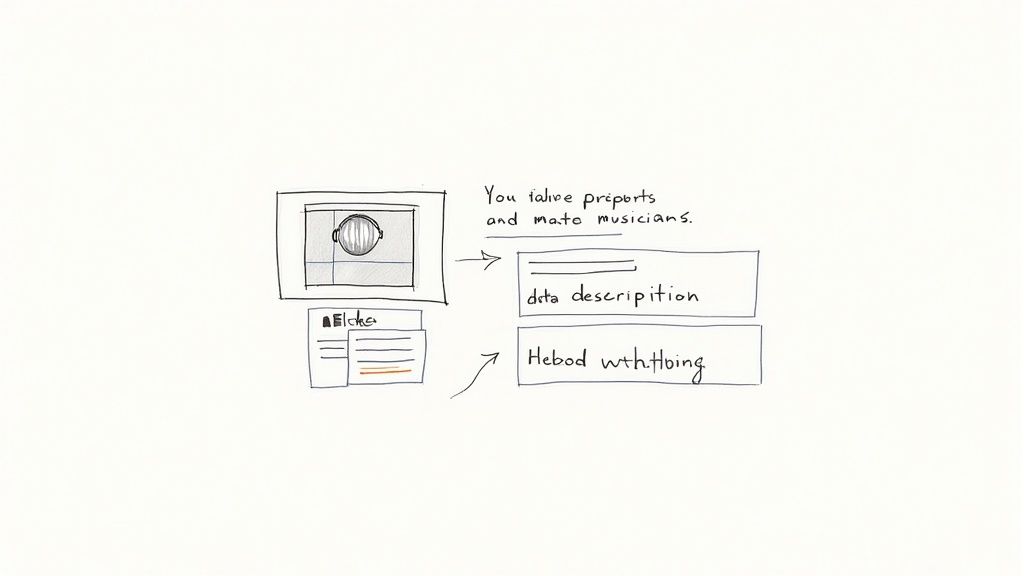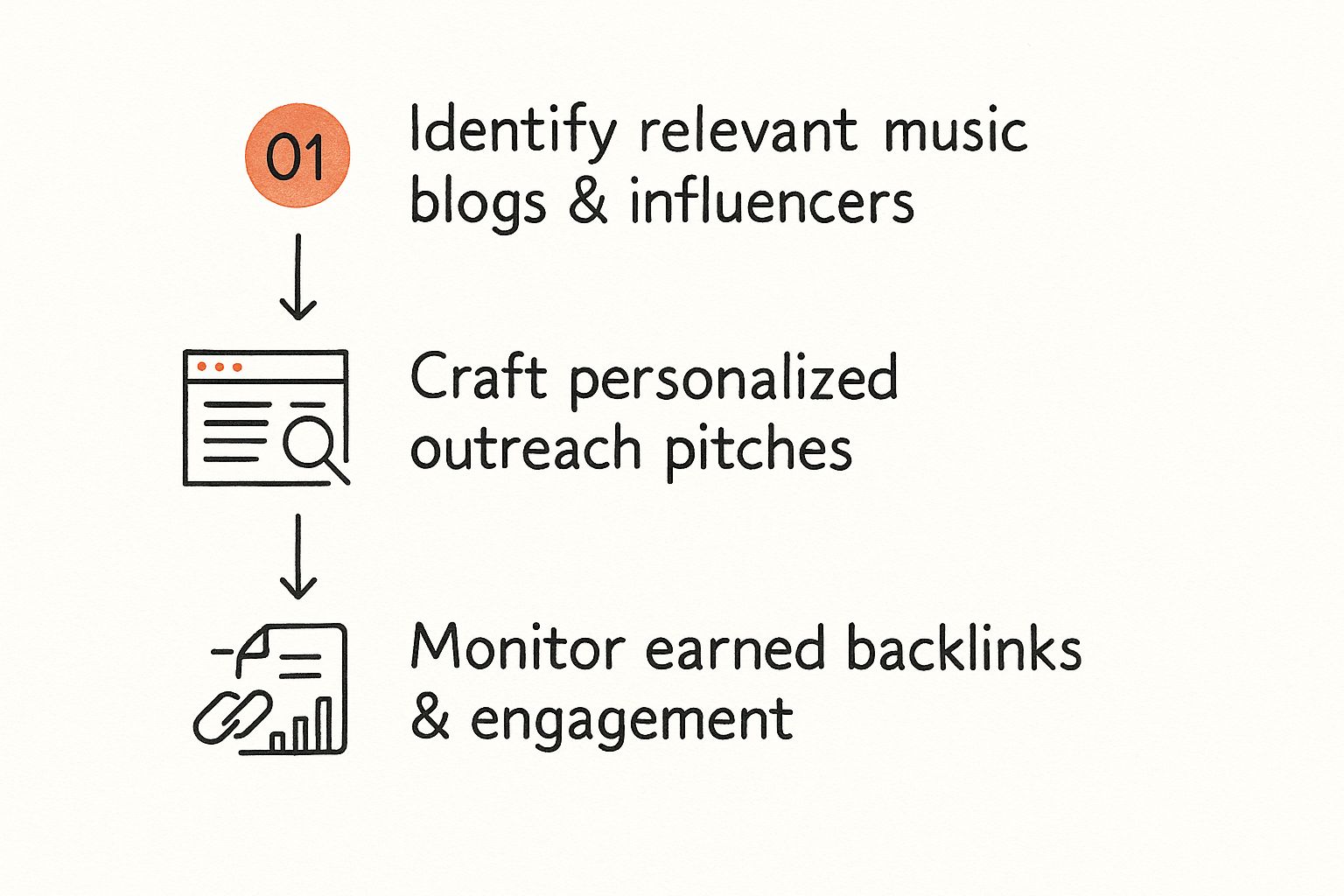SEO For Musicians: Proven Strategies That Drive Discovery
- Jun 1, 2025
- 14 min read
Why SEO For Musicians Is Your Competitive Advantage
The music industry is incredibly competitive. Emerging artists fight for attention alongside established acts, all while navigating a digital world filled with content. This makes discoverability a major challenge. However, SEO for musicians offers a powerful way to overcome this, leveling the playing field and empowering artists with smaller budgets to compete effectively. It's rapidly becoming the key differentiator between thriving artists and those struggling to gain recognition.
This increased digital focus means artists who understand online optimization have a clear advantage. For example, independent musicians using SEO can outrank major label artists in search results, organically connecting with a broader audience. This organic approach builds a truly dedicated fanbase, unlike paid advertising which often produces short-lived results.
Digital engagement in the music industry has exploded, with Search Engine Optimization (SEO) playing a crucial role in boosting musicians' online discoverability. Musicians now face intense competition, with millions of tracks vying for listeners' ears. A solid SEO strategy helps artists cut through the noise. This means optimizing various online aspects, including content creation, website design, link building, and mobile optimization. Discover more insights about SEO for musicians.
How SEO Creates Opportunities for Musicians
SEO for musicians unlocks numerous opportunities that might otherwise remain out of reach. Think of SEO as a tireless virtual manager constantly promoting your music. It helps you connect with:
New Fans: Ranking higher in search results for relevant keywords brings your music to potential fans actively seeking artists just like you.
Venues and Promoters: Venue owners and promoters often use search engines to find local artists for gigs and events. SEO improves your visibility to these industry players.
Media and Bloggers: Music bloggers and journalists regularly search for new music to review and feature. SEO helps put you on their radar.
Collaborators: Other musicians and producers looking for collaborators in your genre can easily discover you through optimized online profiles.
Mindset Shift: From Obscurity to Visibility
Successfully implementing SEO for musicians requires more than just technical expertise. It requires a shift in mindset. Artists need to:
Embrace the Digital Landscape: Recognize that an online presence is no longer optional; it’s a necessity. Your website and social media are your digital stage.
Understand Your Audience: Figure out your target audience and their music search habits. What keywords are they using? Which platforms do they use most?
Create Value for Fans: Prioritize creating high-quality content that resonates with your audience, not just content meant for search engine algorithms.
Be Consistent: SEO is an ongoing effort, not a one-time solution. Regularly update your website, produce new content, and interact with your fans.
By adopting this strategic approach, you can utilize SEO to create a lasting music career in today’s competitive music environment. The following sections will explore the practical steps to implement effective SEO strategies specifically designed for musicians.
Building Your Music Website That Gets Found
Your website is more than just a digital presence; it's the central hub for connecting with fans actively searching for music like yours. Many musicians overlook key SEO (Search Engine Optimization) opportunities that can significantly boost their visibility. This section covers the fundamental elements search engines value, guiding you through essential pages, technical adjustments, and creating a seamless mobile experience.
Essential Pages Every Musician Needs
Every music website needs a core set of pages optimized for both fans and search engines. Think of these pages as the cornerstone of your online presence. They help fans easily navigate your site and provide search engines with clear information about your music.
Homepage: A concise introduction to you and your music, highlighting your latest release or upcoming shows.
About Page: Share your story, influences, and what distinguishes your music. Use keywords that describe your genre and style.
Music Page: Provide readily accessible streams and downloads of your music. Include lyrics, album art, and credits.
Shows Page: List upcoming gig dates, past performance highlights, and ticket links. Optimize this page with location-based keywords for local SEO.
Contact Page: Offer clear contact information for fans, venues, and the press.
Blog (Highly Recommended): Regularly posting about your creative process, insights, and news keeps your site fresh and engaging for both fans and search engines.
To further illustrate the importance of each page for SEO, let's look at the following table:
Essential Website Pages for Musicians SEO
Comparison of must-have pages for musician websites and their SEO benefits
Page Type | SEO Benefit | Content Focus | Priority Level |
|---|---|---|---|
Homepage | Introduces your brand and music to search engines and fans | Latest release, upcoming shows, brief bio | High |
About Page | Provides context and background about your music | Artist story, influences, genre, musical style | High |
Music Page | Showcases your work and allows for easy listening/purchase | Song streams, downloads, lyrics, album art | High |
Shows Page | Attracts local fans and promotes live performances | Upcoming gig dates, past shows, ticket links, location keywords | High |
Contact Page | Builds credibility and facilitates communication | Contact information for booking, press inquiries, fan mail | Medium |
Blog | Drives organic traffic through fresh content and keyword optimization | Music updates, creative process insights, industry news | Medium |
This table summarizes the key role each page plays in attracting both fans and search engine attention. Prioritizing these pages will significantly contribute to a stronger online presence.
Technical Optimizations That Don't Require Coding
Improving your site's search engine rankings starts with understanding SEO. Fortunately, many technical improvements are quite simple.
Ensure your site loads quickly on any device. A slow website can frustrate users and negatively impact search rankings. Use a responsive design, meaning your website automatically adapts to different screen sizes. This provides a consistent experience for all users.
Use clear and concise URL structures that are easy to read and include relevant keywords. Instead of a complex string of characters, use descriptive URLs. For instance, yourwebsite.com/latest-album is much better than a jumbled URL.

Mobile Optimization: Reaching Fans On the Go
Optimizing your website for mobile devices is essential. Over half of all web traffic originates from mobile devices. If your website isn’t mobile-friendly, you're missing a substantial portion of your potential audience.
This means your site needs to load quickly, be easily navigable on a smaller screen, and offer a seamless user experience. Consider how people use their phones to find music and ensure your site caters to those needs. For further mobile optimization tips, particularly concerning Spotify, check out this guide on how to master Spotify playlist placement.
By implementing these website optimization strategies, you're creating a digital home for your music that attracts both fans and search engines. This solid foundation helps your music reach a broader audience and cultivate a dedicated following.
Finding Keywords Your Fans Actually Search For
Generic keyword research often misses the mark for musicians. Fans simply don't search for music the same way businesses search for services. Relying solely on standard keyword tools like Semrush won't be enough. You need specialized techniques to understand how your potential audience really discovers new music. This section will explore these techniques, helping you craft a keyword strategy that resonates with how your ideal fans think and search.
Genre-Specific Search Patterns: Thinking Like Your Target Audience
Understanding the nuances of your genre is key for effective keyword research. A fan searching for "chillhop beats to study to" has a very different intent than someone searching for "thrash metal guitar solos." Think about the specific language and terminology used within your genre. What are your fans searching for? What words would they use to describe it?
To strengthen your website's visibility, consider broader SEO guides like those focusing on ecommerce SEO. While not music-specific, these guides provide a foundation in SEO principles applicable to any website.
Local Discovery: Connecting With Your Community
For performing artists, local SEO is essential. Focus on location-based keywords to reach fans in your area. Think "live music [your city]" or "[your genre] concerts near me." If you're touring, broaden your keywords to target each city. Optimizing your website and social media presence with location-based keywords can draw local fans to your shows. It's all about making it easy for local fans to find you when they're looking for live music.
The Power of Long-Tail Keywords: Targeting Niche Searches
Long-tail keywords are longer, more specific phrases targeting niche searches. While individual search volume may be lower, they often attract highly engaged fans more likely to become dedicated listeners. For example, instead of "acoustic guitar music," try "sad acoustic guitar songs for rainy days." Larger artists often miss these niche keywords, creating opportunities for independent musicians to rank higher and connect with a dedicated audience.

Finding Your Unique Keyword Angle: Standing Out From the Crowd
Your unique story and sound offer valuable keyword opportunities. What sets your music apart? Are you a singer-songwriter sharing personal stories? Do you blend genres in an unexpected way? Weave these unique aspects into your keyword research. For example, instead of "indie rock band," perhaps "indie rock band with folk influences" or "storytelling indie rock music" better captures your distinct style.
Seasonal Trends: Capitalizing on Timely Searches
Music searches often follow seasonal trends. People look for different music during holidays, summer festivals, or back-to-school season. Understanding these trends lets you tailor content and keywords for relevant searches. For example, create a playlist of "spooky Halloween songs" or promote your upbeat summer anthem during festival season. Stay relevant and attract new listeners year-round. By applying these targeted keyword research techniques, you can connect with fans genuinely interested in your music, building a more engaged and dedicated following.
Creating Content That Ranks and Builds Your Fanbase
The most successful musicians know that engaging content benefits both search engines and their fans. Creating content that resonates with both is essential for a thriving online presence. This means striking a balance between providing entertainment and optimizing for search.
Behind-the-Scenes Content: Showcasing Your Personality
Offering fans a peek behind the curtain helps forge a stronger connection. This humanizes you and makes your music more relatable. Behind-the-scenes content can include a variety of formats:
Studio Diaries: Documenting the recording process, sharing snippets of new music, and discussing creative choices.
Rehearsal Footage: Showing the band practicing, working on new arrangements, and preparing for performances.
Tour Vlogs: Bringing fans along for the ride, capturing the travel and performance experience.
Q&A Sessions: Answering fan questions about your music, inspiration, and creative process.
This content engages fans and offers opportunities to incorporate keywords related to your music and genre.
Educational Content: Establishing Your Expertise
Creating educational content positions you as a knowledgeable resource within your field. This approach can attract new fans seeking information while deepening the connection with existing ones. Consider these options:
Tutorials: Sharing your knowledge on songwriting, playing an instrument, or music production techniques.
Gear Reviews: Offering insights into your equipment and its impact on your unique sound.
Music Theory Explanations: Breaking down complex concepts in an accessible way.
This content provides value to fans and presents opportunities for long-tail keyword optimization. For instance, a tutorial on "mixing vocals for indie rock" can attract a specific audience actively looking for that information.
Storytelling: Keeping Fans Engaged and Boosting Rankings
Stories are powerful tools for connecting with your audience emotionally. They can revolve around several key themes:
The Inspiration Behind a Song: Sharing the personal experiences or events that influenced your music.
Overcoming Challenges: Inspiring others by sharing your journey and the hurdles you've overcome.
Connecting With Fans: Highlighting meaningful interactions with your audience.
These stories resonate with fans and create keyword-rich content, increasing your visibility in search results.
Content Repurposing and Measurement
Maximize your content’s impact by repurposing it across various platforms. A blog post can be transformed into a social media update, a short video, or an email newsletter segment. This amplifies your SEO efforts without creating entirely new content. Track your content’s performance with tools like Google Analytics and artist.tools' Spotify SEO Research feature. Monitor metrics like organic traffic, time on page, and keyword rankings to refine your content strategy and grow your fanbase. This continuous improvement process helps you achieve lasting SEO success.
Optimizing Your Streaming And Social Presence
Your Spotify, Apple Music, and social media profiles are key components of your overall online presence. They work together to boost your visibility and connect you with new fans. This interconnectedness calls for a unified strategy that maximizes the strengths of each platform.
Maximizing Your Streaming Profiles: Beyond The Basics
Many artists focus on basic profile information on streaming services like Spotify and Apple Music. But going further can significantly improve your discoverability. Optimize your artist bio with relevant keywords, just like you would for your website. This helps fans find you when searching on these platforms. Consider the terms fans might use when looking for artists similar to you, and incorporate those terms naturally into your bio.
High-quality images and album art are also crucial. Consistent visuals across all platforms reinforce your brand and make you instantly recognizable. Think of your visual presentation as a visual keyword, a quick way for fans to identify your music.
The Power Of Social Signals: How Social Media Influences SEO
Social signals, such as shares, likes, and comments, are increasingly important for online visibility. While not a direct ranking factor for search engines, they demonstrate audience engagement and content relevance. A vibrant social media presence builds your online authority. This, in turn, improves your visibility across the web, including on streaming platforms. Want to learn more about social media for musicians? Check out this helpful guide: How to master social media marketing for musicians.
Cross-Platform Content Strategy: Multiplying Your Efforts
A well-planned cross-platform content strategy can significantly amplify your reach. Share snippets of your latest track on Instagram and link to the full song on Spotify. Post behind-the-scenes content on YouTube and mention it on Twitter, directing fans to your website for more information. These tactics maximize your content's impact, driving traffic between platforms and strengthening your overall online presence.

Case Studies: Learning From The Pros
Studying successful artists can offer invaluable insights into effective multi-platform optimization. Analyze their strategies, paying attention to how they use each platform's unique features. For example, see how they use Instagram Stories for behind-the-scenes glimpses or how they utilize TikTok to create viral music challenges. This provides practical, real-world examples you can adapt to your own approach.
Leveraging Platform Features: Making Every Feature Work
Every platform offers unique tools. Spotify's Canvas feature, for example, lets you add short, looping visuals to your tracks. This is a great way to reinforce your branding and engage listeners. Apple Music allows custom artist images for playlists, providing opportunities for targeted promotion. On social media, use features like live streams to connect directly with your fans and build a stronger community. As of 2025, online music consumption is higher than ever, and musicians are increasingly using SEO to expand their reach. Learn more about optimizing your music for search engines here. By understanding and using each platform's specific tools, you can create a more robust and effective online strategy, boosting your discoverability and fostering deeper fan engagement.
Local SEO That Fills Venues And Books Shows
For musicians who perform live, local SEO is essential for success. It can be the key difference between playing to a small crowd and building a loyal local following that fills venues. This section focuses on location-based optimization strategies specifically designed for performing artists. Learn how to rank higher in local search results, ensuring fans find you when searching for live music in their area, even if you tour across multiple markets.
Dominating Local Search Results
When music fans search for live performances, you want your band or artist name to be among the top results. One of the best ways to achieve this is by optimizing your website and online presence with location-based keywords. For example, if you're a blues musician in Chicago, use phrases like "blues music Chicago" or "live blues bars Chicago." This helps search engines like Google connect your music with the right geographic area. If you're a touring artist, remember to tailor your keywords for each city on your tour schedule.
Google My Business: Your Local Hub
Google My Business (GMB) is a free and incredibly valuable tool for local SEO. First, claim and verify your GMB profile. Then, ensure all the information is accurate and up-to-date. This includes your band name, genre, performance schedule, contact details, and high-quality photos. Don't forget to encourage your fans to leave reviews on your GMB profile, as positive reviews boost your credibility and can improve your local search rankings.
Local Directories and Citations
Listing your band on relevant online directories and local music sites is another effective strategy. Consistent citations across multiple platforms strengthen your local online presence. Consider local event listings, community calendars, and music-specific directories in your target areas. Maintaining consistent NAP (Name, Address, Phone Number) information across all these platforms is critical for local SEO.
Connecting With the Local Music Scene: Building Backlinks
Engaging with your local music community is an excellent way to build valuable backlinks. Reach out to local music blogs, websites, and online influencers to gain coverage. You could offer exclusive content, interviews, or early access to your new music. Collaborate with local venues and promoters, making sure they link back to your website from their event pages.
The following infographic shows a simplified process for getting backlinks from music blogs and influencers:

By identifying relevant influencers, crafting personalized pitches, and tracking engagement, musicians can build high-quality backlinks that improve local search visibility and build a strong presence within their music community. These relationships are valuable, not only for generating backlinks but also for fostering genuine connections within your local scene.
Review Management: Amplifying Your Reputation
Actively managing your online reviews is crucial. Respond to both positive and negative reviews professionally and thoughtfully. Encourage happy fans to share their positive experiences online. Positive reviews build social proof and increase your visibility in local search results. Address negative reviews promptly and politely, demonstrating your dedication to fan satisfaction. This shows potential fans and venue owners that you value your audience and take their feedback seriously.
To help organize your efforts, here’s a sample action plan:
Local SEO Action Plan for Musicians: Step-by-step local optimization tasks with timeline and priority levels
Task | Timeline | Difficulty | Impact Level |
|---|---|---|---|
Claim and verify Google My Business listing | Within 1 week | Easy | High |
Optimize Google My Business profile with photos, descriptions, and categories | Ongoing | Easy | High |
List on local music directories and citations | 1 month | Medium | Medium |
Build backlinks from local music blogs and influencers | Ongoing | Medium | High |
Monitor and respond to online reviews | Ongoing | Easy | High |
Research and use location-based keywords on your website and social media | Ongoing | Medium | High |
This table provides a starting point for implementing local SEO strategies. Remember to adapt the timeline and prioritize tasks based on your specific needs and resources.
By consistently applying these strategies, you'll be well on your way to not just filling venues, but also cultivating a dedicated local fanbase that will support your music career for years to come.
Measuring Success And Scaling Your Music SEO
Tracking the right metrics is essential to understanding what's working within your SEO strategy. It's more than just looking at website traffic. This section explores the key performance indicators (KPIs) that matter most for musicians, covering how to set up effective tracking, interpret data, and adapt your strategy as your career progresses.
Key Performance Indicators For Musicians
For musicians, success involves connecting with fans and building a thriving career, not just website visits. This requires concentrating on KPIs that directly reflect these goals.
Search Rankings: Where do you appear in search results for relevant keywords? Higher rankings translate to increased visibility for your music.
Organic Discovery: How much of your website traffic originates from search engines? A strong organic presence signals effective SEO practices.
Fan Engagement: Are fans interacting with your content, listening to your music, and spending time on your website?
Booking Inquiries: Are you seeing a rise in inquiries from promoters and venues through your website?
These metrics paint a more detailed picture of your SEO success than just looking at website traffic alone.
Setting Up Tracking Systems for Actionable Insights
Using the right tools is essential for effective tracking. [Google Analytics](https://analytics.google.com/) is a must-have for monitoring website traffic and user behavior. artist.tools builds on this, offering valuable information on monthly listeners, playlist performance, and more. Setting clear goals and tracking relevant KPIs within these platforms is key to turning data into action. For instance, if your goal is increased organic discovery, track your keyword rankings and organic traffic sources.
Interpreting Analytics Data: Making Informed Decisions
Data without interpretation is useless. Regularly review your analytics to spot patterns and trends. This allows you to identify areas for improvement and what's already working well. For example, if a particular blog post drives significant traffic, analyze its success and apply those insights to future content. If your search rankings for a specific keyword are falling, investigate the potential causes and adjust your optimization strategy. You might find this helpful: How to better understand your Spotify revenue.
Adapting and Scaling Your SEO Strategy
Your SEO strategy should evolve alongside your music career. What worked initially may not be as effective as you gain recognition. Continuously analyze your performance, stay updated on algorithm changes, and adjust your strategy to maintain progress. For example, as your fanbase expands, you might shift from local SEO to broader keyword targeting. If a particular social media platform is highly effective, consider allocating more resources there. This continuous adaptation keeps your SEO efforts aligned with your career goals and contributes to long-term success.
Ready to boost your music career? Visit artist.tools today and explore the powerful tools designed to help musicians flourish.
The strategies shared are really insightful and can help any artist improve their online presence. As musicians, leveraging the right tools to drive discovery is crucial. One way to do this effectively is by incorporating SEO Automation Tools into your workflow. These tools can automate time-consuming tasks like keyword research, content optimization, and tracking, allowing you to focus more on your music and less on the technical side. If you're looking for ways to improve your SEO strategy, I highly recommend checking out more resources like these to help your music get discovered!